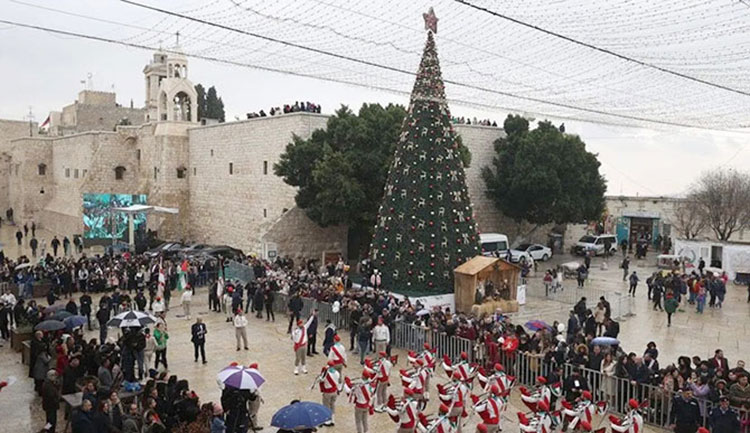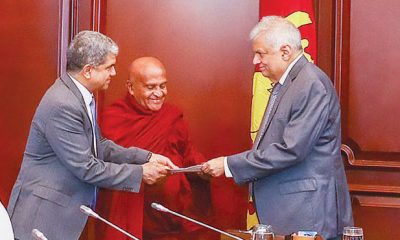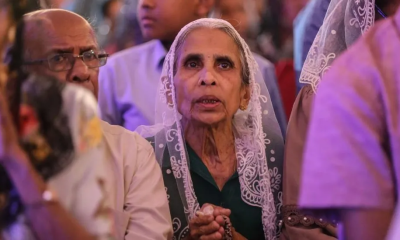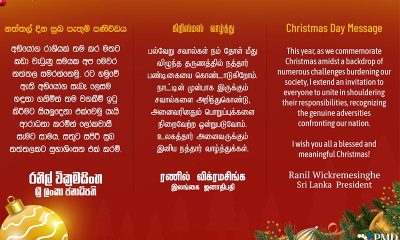Features
No Christmas in Bethlehem, Breakthrough in Vatican, and Himalayan Declaration

by Rajan Philips
In Bethlehem where it all began, there is no Christmas this year. Bethlehem is located in Israeli occupied West Bank of Palestine. Palestinian churches have reportedly cancelled Christmas celebrations and some of them have set up nativity scenes showing the symbolic Baby Jesus lying in a manger of rubble destruction. Death and destruction now define life in Gaza less than 100 km to the west, but Palestinians on the West Bank are also subject to unchecked attacks by illegal Jewish settlers and retaliation by the Israeli army against Palestinian protests.
It is all Christmas in the US but in a climate of national political confusion in spite of a robustly performing economy. The confusion about the war in Israel, not to mention the one in Ukraine; the hysteria over antisemitism, with the US Congress declaring opposition to Zionism as antisemitism; the for and against moves centered on Donald Trump; and competing expectations and forebodings for the great election year of 2024.
There will be little Christmas time in Washington for the Biden Administration, which is literally on the horns of its own dilemma of simultaneously supporting and restraining the Israeli government’s devastation of Gaza.
At the last UN General Assembly vote on October 12 when 153 countries called for a ‘humanitarian ceasefire,’ 20 countries abstained, and the US voted against the resolution along with Israel and eight other minions. But the US encouraged its allies (e.g., Australia, Canada and New Zealand, three of the Five Eyes along with the US and the UK) to take up a united position and support the resolution.
At the time of writing (Thursday evening, New York / Friday morning, Colombo), the US is finally trying to give support to a UN Security Council resolution calling for “suspension of hostilities” and “scaled-up humanitarian aid access to Gaza.” Unlike the General Assembly resolutions, Security Council resolutions have legal teeth.
The Security Council vote has been delayed several times at the US’s asking to find acceptable wording to support it and not veto it. If the resolution passes, that would be the first in the current crisis. With Hamas insisting that there will be no more release of hostages until Israel completely stops its attacks on Gaza, the US and its Middle East allies are looking for alternative avenues to bring about a ceasefire, howsoever it might be called.
As Canadian academic and international relations expert Janice Stein observed after the UN General Assembly vote, the US has “significant influence over what comes next … Starting in 1956 the United States has frequently forced Israel both to stop the fighting, accept the ceasefire and at times to pull back.” So, this will not be the first time that the US might use its influence to bring about a ceasefire.
How soon the US will be able to do it this time is the question. Otherwise, there is no immediate end in sight to this conflict even well into the New Year. With Yemen’s Houthis emboldened to attack merchandise ships in the Red Sea, the whole conflict may take a different turn. The other conflict in Ukraine has entered a stalemate favourable to Russia, with fatigue setting in among Ukraine’s sponsors about continuing their material support of the war.
Breakthrough in Vatican
Lost in the din of war is what otherwise would have been an excellent Christmas gift and news. Last Monday, a week before Christmas, Pope Francis, the Jesuit Pope, issued a landmark authorization for priests to administer blessings on same-sex couples but outside the Church’s regular mass or formal rituals. This is a reversal of the Church’s 2021 declaration disallowing such blessings in keeping with the Catechism of the Catholic Church. The change is considered as providing a “simple blessing” and not the sacrament of (heterosexual) marriage. Yet, it is a huge step for the Vatican.
The change will have its supporters and decriers, and more so in the US than anywhere else. American Jesuit Father James Martin who works among LGBT communities, has welcomed the change as “a major step forward in the church’s ministry” to them. Many same sex-couples are delighted. The conservatives in the Church are obviously opposed to it. Ulrich L. Lehner, a US theology professor, reflecting his nation’s penchant for culture wars, has called it “an invitation to schism”.
The Vatican breakthrough comes two months after the conclusion of the historic synod that Pope Francis had convened to guide the future of the Catholic Church. For the first time in its history the Church convened an official gathering of 364 members that included non-clerical members of the Church including 54 women. The Pope called for the meeting in 2021 as part of his efforts to reform the church and to bring the superstructure of the Church into alignment with the base of its faithful followers. Preparations over two years included consultations among Catholics around the world. Women’s role in the Church emerged as a central question with almost universal call for opening up opportunities for women to take on decision-making roles in the Church.
After nearly a month of deliberations the Synod issued a Synthesis Report of 41 pages with each paragraph voted separately and receiving over two-thirds majority. The synod process and experience were based on listening and formulating positions rather than receiving top down resolutions. The report covered all the current challenges facing the Church including clerical sexual abuse, women’s roles in the church, outreach to poor and the concept of “synodality” itself.
The report noted that throughout the synod process, “many women expressed deep gratitude for the work of priests and bishops. They also spoke of a Church that wounds. Clericalism, a chauvinist mentality and inappropriate expressions of authority continue to scar the face of the Church and damage its communion.” “A profound spiritual conversion is needed as the foundation for any effective structural change,” it said. “Sexual abuse and the abuse of power and authority continue to cry out for justice, healing and reconciliation.” The same issues will be in focus again when the synod reconvenes in October 2024.
A Himalayan Declaration
Sri Lanka has its problems, a continuation of the economic crisis that began last year, and unprecedented in its own historical parallels. Yet it is fortunate enough to be where it is unlike many of the other world’s troubled spots. And all of a sudden the country received a shot in the arm, so to speak, aimed at addressing its most chronic problem involving the political relationship among its communities. The shot came literally entitled as the Himalayan Declaration, and it became public after it was formally presented by its authors to President Wickremesinghe. More presentations to other notables are reported to be in the offing. But what difference the declaration is going to make is too early to tell.
The grand sounding name Himalayan Declaration is apparently derived from the small town of Nagarkot in Nepal, where the signatories to the declaration gathered and reached their six-point agreement as the basis for yet another initiative to resolve Sri Lanka’s national question. After the experiences of Thimphu, Oslo, and numerous other gatherings and consultations in many parts of the world including many cities in India, one can only wish heavenly blessings for the latest initiative coming down from the Himalayas to finally succeed. Most of us can only wish and watch, but the success of the initiative will ultimately depend on who among Sri Lanka’s current political actors will take over the initiative and cross the finish line.
The signatories to the new initiative portray an interesting coalescence comprising all Buddhist Priests from among the Sinhalese, and all Tamil expatriates living in western countries seemingly acting on behalf of the Tamils.
One would think the involvement of the Buddhist Priests, all of whom appear to be at the higher echelons of the Sangha hierarchy is intended to maximize the declaration’s purchase among the Sinhalese. Conversely, if their presence in the declaration can dampen the usual rabble rousing against such initiatives, that in itself would be a significant contribution.
The expatriate Tamil signatories to the declaration and others who worked on it are not household political names in Sri Lanka or among the Sri Lankan diasporas. But they have been in the business of ethnic politics for all their adult lives, and their intervention at this stage deserves due commendation. Unlike the interlopers who used to pop up during the Rajapaksa and Sirisena years, the present group is obviously not looking for handouts from the government. But that is not going to save them from brickbats that will be flung at them from their far flung compatriots, which seem to have already started.
There is never going to be unanimity among the Tamils on any proposal(s) for reconciliation. That is not in their collective DNA. But if there is substantial support among the Sinhalese for a significant initiative that is also championed by the government in power, then the collective Tamil response will be equally positive. Otherwise, even if the Tamils are unanimous in their support for an initiative it will not go anywhere without sufficient purchase among the Sinhalese. One shortcoming of the initiative is the absence of Muslim and Indian Tamil participants and signatories. Obviously, it could not have been an intended omission, but in ethnic relationships inadvertent omissions can be as damaging as deliberate ones.
Features
Shame! Ragging raises its cowardly head again

Ragging at Sabaragamuwa university has resulted in the loss of another student’s life and there is another incident of barbaric attack on an anti-rag student of J’pura university by some students from the same university. Whether the bullies are backed by political parties or not, they show their undeveloped and conformist minds that need urgent refinement; if they are connected to political parties and student unions, the latter show only their vulgarity and duplicity when they wax eloquent about modern education, culture, decadent politics, human rights, corruption and all that jazz. That this barbarous practice continues in broad daylight and under the very nose of university and law enforcement authorities is deplorable and puzzling to say the least. It is ironic that the best minds, the superstars in academia, the leading lights in education and the guardians of all that is progressive have become helpless spectators of this bullying happening in their universities. The ignominious records of rag victims in our country are a crying shame as all those perpetrators have been from that somewhat musty and largely conservative ‘cream of intelligence’ as they are called at all inauguration ceremonies where their egos are pampered.
Ragging in our universities is a sure sign of the backwardness of our culture and education, in comparison with that of civilized societies. The brutal practice of ragging shows that education in our country, both in schools and universities, has a lot of room for improvement about making the undergraduate population sensitive and sensible, more than ‘educated’. Of course, we can understand torture if it is something which happens in the underworld or in any place where the new recruits must be brutaliesed before they are admitted to their circles, but how can one understand when it happens in the highest seats of academia? Professor O. A. Ileperuma has, in his article “Ragging and loss of life” published in The Island of 5 May 2025, stated that some academics turn a blind eye to ragging perhaps “because they themselves were raggers in the past and see nothing harmful in such sordid instances of ragging”. This is pathetic and may perhaps prove some of the accusations that have been made ad nauseum about the lack of a wholesome education in our university system, which is said to be obsessed with mass producing ‘employable graduates’.
As they say, desperate times call for desperate measures. As far as the ragging culture in our universities is concerned, desperate measures are long overdue. In the highest institutes of learning where knowledge is produced and all the progressive and advanced ideas are supposed to be generated, there has been unfathomable brutality, crudeness and conventionality in the name of an acquired beastliness which they call ‘ragging’ to give it a quasi-academic smell when all it amounts to is lack of refinement which can be linked to numerous reasons.
Most of the culprits are the victims of a system which esteems hierarchy where it is accepted that superiority is synonymous with repressive power and inferiority is another term for meekness and passive acceptance of all commands coming from above. It is a mentality which is based on the warped logic that superiority is absurd if the seniors have no right to snub the juniors. Those who have tasted humiliation in one form or another for long due to reasons inherent in society can grow up to be vengeful. Most of these diehard raggers often show signs of this mentality in the way they behave the minute they have been automatically lifted to their pathetic superiority after one year in the university where they enjoy a mistaken sense of immunity from the law. The widely publicised idea of ‘freedom’ associated with universities and their relative aloofness from the rest of society and the aura they have acquired have made them safe havens for the raggers if the unmitigated brutality in ragging over the long years is any indication. The question is why (oh why?) these learned bullies despise civilised behaviour so much in their enclaves of power merely on the strength of one year’s seniority. If it is their one year’s accumulated knowledge which makes them feel superior to the newcomers in an aggressive way, surely, such knowledge is questionable, which must intrigue educationists, psychologists, sociologists and all academics interested in the role of education in character building.
Raggers have been saying ad nauseam that ragging is given to make the new entrants tough enough for academic work. As we know their methods include using foul language, humiliation, intimidation, physical and psychological abuse, torture, beating and forcing rigorous exercises even leading to death. The resultant trauma has led some to commit suicide. All this is done to help the new students with a proven capacity for hard work in the academic field!
However, there are some pertinent questions to be asked. Is this method of building resilience of potential academics backed by research? Should this ‘programme’ be conducted by senior students (who are apparently mentally unsound)? Aren’t there better qualified people to conduct a civilised programme which would help make the newcomers ready to face the trials of academic life? Do they believe that no refined programme can be as ‘effective’ as their ragging? Why should they spend their valuable time doing it when it can be done by experts in a more organised and civilised manner? Have they ever been cultured enough to discuss this so-called ‘personality development’ programme with the relevant authorities and academics, with any reliable evidence to prove its effectiveness?
As we know, these raggers who are self-appointed ‘experts’ in character building of sorts expect total submission from the juniors they try to brutalise, and those who dare resist this bullying are viciously suppressed. To what extent does this compulsory compliance expected from the new students at the beginning of their academic career help them to be better undergrads?
How much more brutality in ragging is to be endured by the new university entrants for “desperate measures” to be called for?
by Susantha Hewa
Features
80th Anniversary of Second World War

One of the most important dates in World War II, is May 9, 1945, when the Soviet red flag with the hammer and sickle emblem was raised over the Reichstag building, the German parliament. This confirmed Germany’s unconditional surrender to the Soviet Union. Since then, 80 years have passed upto May 9, 2025. It is very timely to look back on the past 80 years of history, and to briefly discuss some of the current issues and the future.
Beginning and End of the 2nd World War
World War II began on September 1, 1939, when Nazi Germany attacked Poland. Within a year of the war, the world’s imperialist powers had divided into two camps. Germany was on one side, targeting Europe, Italy Africa, and Japan Asia, while Great Britain, the United States, and France were on the other side of the war.
Within a short time from the start of the war, Germany had conquered many countries in Europe, and on June 22, 1941, Nazi Germany attacked the Soviet Union. The Soviet Union joined the anti- Nazi Allies and launched the “Great Patriotic War” to defend the world’s first socialist state, and progressive forces around the world acted in a way that supported the Soviet Union.
Three major battles known as the Battles of Moscow, Stalingrad, and Kursk turned the tide of World War II, shattering Hitler’s dream of capturing Moscow in a few months (4 months) through Operation “Barbarossa” and celebrating the victory from Red Square. By the beginning of 1945, the entire Soviet Union had been liberated from Nazi Germany, and by March 1945, the Soviet Red Army had surrounded Berlin from the east, south, and north, and then surrounded the entire city, surrendering the German forces, ending the European War of World War II on May 9.
World War II was a major war in which 61 countries, representing 89% of the world’s population participated, and the total number of deaths in this war was 50 million, of which 25-30 million were Soviet citizens. The Soviet Red Army, which ended the Great War for the Liberation of Europe on May 9, 1945, entered the Battle of Manchuria three months later on August 9, 1945, and defeated imperialist Japan. By then, the United States had dropped atomic bombs on Hiroshima and Nagasaki (on August 6 and 9). Thus, the Soviet Union played the major role in defeating the fascist military coalition, including Nazi Germany, during World War II.
Post-World War order
Negotiations, to shape the post-war world order, began while World War II was still ongoing. In talks held in Washington in January-February 1942, in Canada in 1943, later in Moscow, and in Tehran, Iran in November-December 1943, the Soviet Union, the United States, Great Britain, and China agreed to establish an international organisation with the aim of preserving world peace. Later, the Soviet, American and British leaders who met in Yalta in Crimea agreed on the structure of the United Nations, the Security Council, and the veto power, and the United Nations Charter, signed by 50 countries in San Francisco in 1945, came into force on October 24, 1945.
Rise of Socialist world and collapse of colonialism
With the Soviet victory in World War II, the world underwent unprecedented changes. Although Mongolia was the only socialist state other than the Soviet Union at the start of World War II, after that war, Czechoslovakia, Poland, Romania, Bulgaria, Hungary, Yugoslavia, and Albania in Eastern Europe also became socialist countries. The Democratic Republic of Vietnam was established in 1945, and in 1947 a socialist state was established in East Germany under the name of the German Democratic Republic. The Chinese Revolution triumphed in 1949, and the Cuban Revolution triumphed in 1959. Thus, the socialist system established in a single country by the October Revolution in 1917 developed into a world system against the backdrop of the unique victory of the Soviet Union in World War II.
Another direct result of the victory in World War II was the collapse of the colonial system. National liberation struggles intensified in Asia, Africa and Latin America, and new independent countries emerged one after another on these continents. In the 25-30 years that followed the end of World War II, the colonial system almost completely collapsed. The United Nations, which began with 50 member states, now has 193 members.
With the end of World War II, working class struggles intensified. Communist parties were formed all over the world. Although the Sri Lankan working people’s movement was in a state of truce during World War II, the war ended in May 1945 and by August it had gone on a general strike. The 8-hour workday, wage boards, holiday systems and monthly salary systems were won through that struggle. The working class movement in this country was able to win many rights, including pension rights, overtime pay, and other rights, through the general strike held in 1946. Although the general strike of 1947 was suppressed, there is no doubt that the British government was shocked by this great struggle. In the elections held in 1947, leftist and progressive groups were elected to parliament in large numbers, and independence with Dominion status was achieved in 1948.
World is in turmoil
Until this era, which is 80 years after the end of World War II, the world has so far managed to prevent another world war. Although there have been no world wars, there have been several major conflicts around the world. The ongoing Middle East conflict over the forced displacement of the Palestinian people, the conflict created by Western powers around Iran, the Russia-Ukraine conflict, and the recently escalating Indo-Pakistan conflict are among them. The limited military operation launched by Russia to prevent the NATO organization reaching its borders, has transformed into a battle between Russia and the collective West. But the conflict now seems to have entered a certain path of resolution.
Several parties have launched trade wars that are destabilising the world, perhaps even escalating into a state of war. Thousands of trade sanctions have been imposed against Russia, and the US President has declared a trade war by imposing tariffs on dozens of countries around the world.
Meanwhile, the world has not yet been able to provide a satisfactory solution to the problem of global warming, which has threatened the existence of the entire human race.
The Bretton Woods Organizations (International Monetary Fund and World Bank), which were economic operating institutions established after World War II, have not only failed to lead the world’s economic development, but there is a strong allegation that the guidance of those institutions has exacerbated the economic problems of newly independent countries.
At this time of commemoration of the 80th anniversary of World War II, it is our responsibility to resolve the above problems facing the people of the world and to dedicate ourselves to the future of humanity.
Way forward
Accordingly, a futuristic, new economic order is emerging, and a multipolar world has been formed. The most important point to emphasise here is that the world order that was established after World War II, which encompasses various fields, is a system jointly developed by the great powers that won that war, and the reforms that need to be made in accordance with the demands to change this world order to suit the current reality must be identified collectively. No single country can change these world structures.
People are rallying all over the world for issues related to the survival of the entire human race, such as controlling global warming. New programmes that contribute to the economic development of most countries in the world have been or are being developed. The New Silk Road projects, the BRICS organisation, the New Development Bank, the Asian Infrastructure Investment Bank, and the Shanghai Cooperation Organization are such programs/new institutions. A global process has been launched to prevent a nuclear war and maintain world peace.
Many of the above-mentioned issues and problems have arisen through imperialist military and economic planning and operations, and therefore, the contradiction between imperialism and the people has become the main contradiction of this era. Therefore, it must be emphasized on the 80th anniversary of the Second World War that the way forward in the world will be through the people’s struggle against imperialism.
by Dr. G. Weerasinghe
General Secretary, Communist
Party of Sri Lanka
Features
New Mayors; 80th Anniversary of VE Day; Prince Harry missteps yet again

 This week’s Cry is put together as the voting goes on for mayors of Municipal Councils. Cass is rather confused about this second tier of government, so she googled and here is what she got: “There are currently 29 municipal councils in Sri Lanka. These councils govern the largest cities and first tier municipalities in the country. The local government system also includes 36 urban councils and 276 Pradeshiya Sabhas.” Not that this has made matters clearer to Cass.
This week’s Cry is put together as the voting goes on for mayors of Municipal Councils. Cass is rather confused about this second tier of government, so she googled and here is what she got: “There are currently 29 municipal councils in Sri Lanka. These councils govern the largest cities and first tier municipalities in the country. The local government system also includes 36 urban councils and 276 Pradeshiya Sabhas.” Not that this has made matters clearer to Cass.
She believes that for a small country of 22 m people, we are too heavily governed from above, with a central government and then all these councils and sabhas below. Consider the number employed in them; most underworked and underworking. Another matter is that if you want a matter seen to, regarding property rates, etc., you are most often sent from this Sabha to that council.
This came about with the 13th Amendment to the Sri Lanka Constitution introduced on November 14, 1987, following the Indo-Sri Lanka Accord, which aimed to address the ethnic conflict by granting some autonomy to provincial councils. As Cass believes it was imposed on us by India after the threat expressed by India, instigated by Tamil Nadu, when Prabhakaran in his military childhood, was cornered and almost captured in Vadamarachchi.
India rained parippu on the northern peninsular, demanded no arrests of LTTE; and it was rumoured Indian forces were poised on the southern and south eastern coasts of the subcontinent ready to sail to war to the island below them. PM Rajiv Gandhi came instead; Prez JRJ was constrained to meet, greet and honour him. One rating in a guard of honour which handsome Rajiv inspected, expressed the majority people’s opinion; “We don’t want you here!” After which guards of honour worldwide are kept strictly at a safe distance from the VVIP honoured.
To Cass the most important fact of the election progressing now and its outcome is that she hopes newly elected mayors will insist on the Municipal Councils’ employees doing the work allotted to them: mostly garbage collectors; sprayers against mosquitoes; PHIs inspecting kitchens of eating houses and those in charge of general cleanliness of cities keeping s clean.
Complaints are numerous that roads are dirty, garbage piled up and drains and small waterways clogged so water remains stagnant and thus the rapid spread of most debilitating chikungunya.
May 8 1945 – VE Day
This date marked Victory in Europe. “… after Britain and its allies formally accepted Nazi Germany’s surrender after almost six years of war. At 15.00, the then Prime Minister Winston Churchill announced World War Two in Europe had come to an end.” Allied Forces marched into Germany from west and South and the Russians entered from the north. Hitler committed suicide and the Nazi so far invincible forces were shattered, battered and splintered. It was Emperor Hirohito who surrendered Japan and himself on August 15, 1945, after the Hiroshima and Nagasaki bombings (Aug 6,9).
Thus, this year is the 80th anniversary of the end of World War II and Britain brought out its Palace Guards, forces and cheering crowds to celebrate the event, and more to pay homage to veterans still living and extend gratitude to those soldiers, sailors and airmen and women who laid down their lives to save their country. King Charles III was present in a special seating area which had other members of the royal family; politicians and veterans and their families, while some of those who had served in the war rode in open cars to the cheers of the spectators.
The Netherlands and Canada too mounted celebrations. Canada made it a point to pay allegiance to the British Monarch as their head, and Cass feels sure King Charles III reciprocated with acknowledgement. Commented on were video statements Cass heard that this reiteration was for the benefit of Prez Trump with his plans to annex Canada as the 51st State of the US.
Prince of groans and complaints
In the midst of this pageantry and show of British royal family’s unity was Prince Harry cutting a very poor figure of himself, most in an interview given to the BBC after he lost his British Court of Appeal challenge over his security arrangements. “The Duke of Essex, who attended both days of the hearing at the Royal Courts of Justice last month, was appealing a ruling dismissing his challenge to the level of police protection he receives in the UK” He was demanding armed security for himself and his family if and when they visit England. This was refused because of his own withdrawal from royal duties, opting not to be a working member of the British Royal Family; and moving to the US to live. Videos Cass watched tore him to pieces on several counts. He said he could not bring his wife and children to Britain. He said he wanted reconciliation but his father would not speak with him. Then the blunder of adding the sentiment that King Charles’ days on earth were numbered. “We don’t know how long he has to live.”
He was very annoyed with a compere of a British late-night show for referring to him as Harry with no Prince or Duke salutation. He and his wife are not allowed to use HRH by King Charles’ orders, but it was said Meghan loves using the title. Here is a straightforward case of wanting and not wanting something, of utter selfishness and gross grasping.
Local news in English
Cass bemoans the fact she is no longer able to watch MTV News First at 6.30 of a morning. MTV late news in English is at 9.00 pm but it was repeated the next morning. Served lots, I am sure. In Cass’ case the TV set is monopolised by the two helpers she has with her. They watch teledramas on various channels all through the late evening almost to midnight. Can she butt in? Never! They need entertainment. So, no local news for her these days until she goes to another TV channel for news in English – few available. She hopes TV One will resume its news relay in English at 6.30 am after the welcome chanting of pirith.
Cassandra wishes everyone and our much-loved country a continuation of the peace of Vesak. Oneness of the people as good persons was demonstrated in the crowds in Kandy recently. Mosques opened their doors wide to let in anyone and everyone come in and sleep. All races supplied food and water. Such unity was not seen before. A propitious sign for the future.
-

 Opinion7 days ago
Opinion7 days agoRemembering Dr. Samuel Mathew: A Heart that Healed Countless Lives
-

 Business5 days ago
Business5 days agoAitken Spence Travels continues its leadership as the only Travelife-Certified DMC in Sri Lanka
-

 Latest News3 days ago
Latest News3 days agoNPP win Maharagama Urban Council
-

 Business5 days ago
Business5 days agoLinearSix and InsureMO® expand partnership
-

 Business3 days ago
Business3 days agoJohn Keells Properties and MullenLowe unveil “Minutes Away”
-

 Features7 days ago
Features7 days agoTrump’s economic missiles are boomeranging
-

 Latest News7 days ago
Latest News7 days agoThe Heat index is likely to increase up to ‘Caution level’ at some places in Eastern, Northern, North-central and North-western provinces and in Monaragala and Hambantota districts.
-

 Business4 days ago
Business4 days agoNDB Bank partners with Bishop’s College to launch NDB Pixel awareness
























